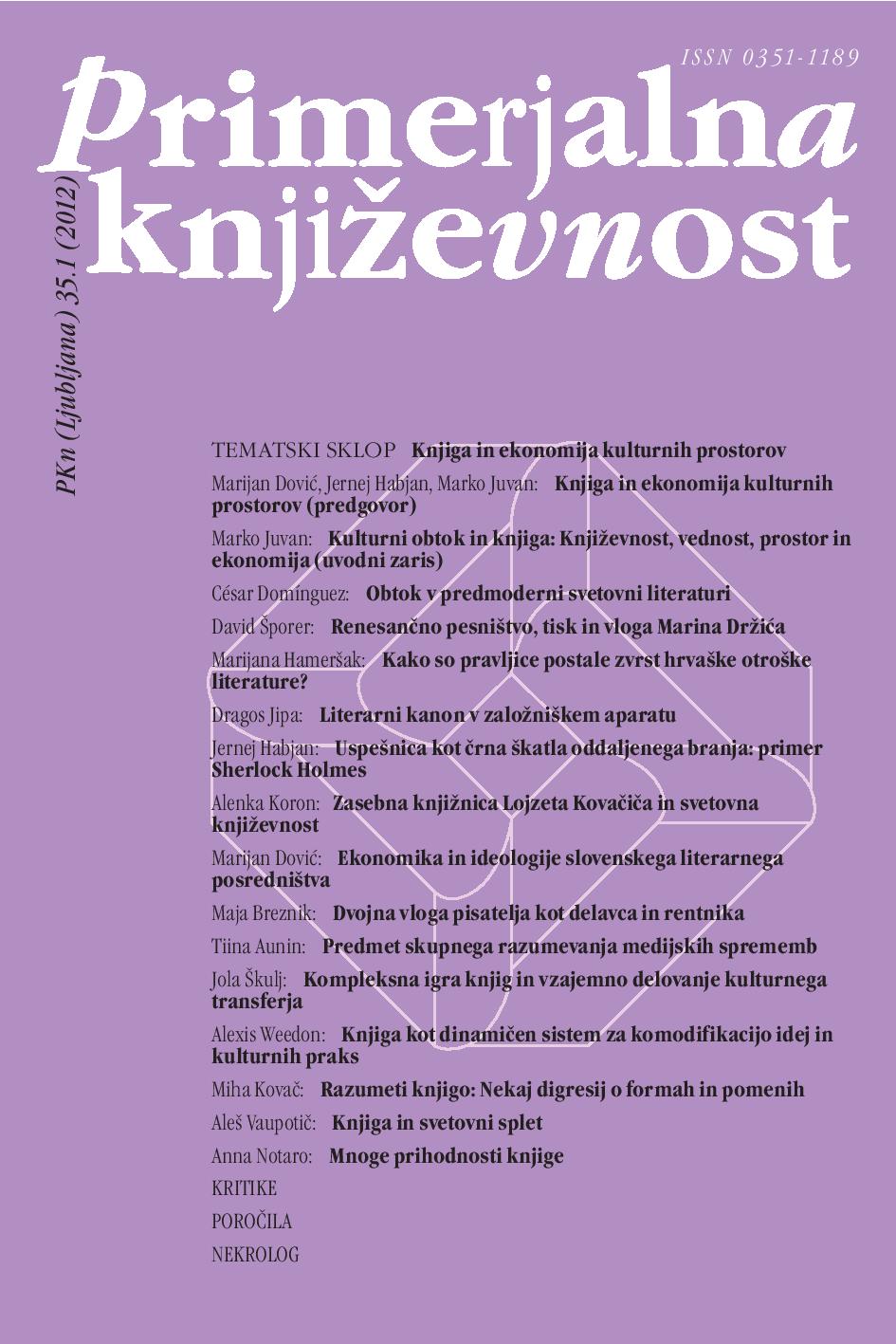Kompleksna igra knjig in vzajemno delovanje kulturnega transferja
Ključne besede:
zgodovina knjige, pisna kultura, literatura, besedilna nedoločenost, fluidnost, semiosfera, branje, semiotsko prevajanje, kulturni transfer, svetovni literarni sistemPovzetek
Razpravljanje o knjigi, o kompleksni in negotovi igri, implicirani v branju in obtoku literature, nas neogibno sooči s fluidno dejanskostjo literarnih besedil in s problemom kulturnega transferja, s tem pa z vprašanji logike, ki obvladuje ekonomijo kulturnih prostorov. S stališča semiotike je mogoče knjige razumeti kot žive dejavnike, ki živo materijo kulture opazno preoblikujejo in so tudi »pogoj za nadaljevanje življenja« (Lotman). Knjige omogočajo kulturni promet, kozmopolitsko druženje literatur sveta, mednarodni pogovor; prek njih obstajajo literarna besedila kot pojavi kulturne mobilnosti in medkulturne menjave ter se pojavljajo kot del svetovnega literarnega sistema. Vendar se v vsaki bralni instanci semiotski podatki transformirajo, saj je branje izjemno kompleksen proces, ujet v labirint pomenjanja, v dinamično mrežo mnoštva sugestij in semiotskih usedlin. Knjige se zapletajo v resno in sofisticirano igro kulture, semiotsko in družbeno posredovano skozi nabor raznoterih preteklih pisanj, poetoloških sledi in diskurzivnih matric. V bralnih dejanjih je vsako upomenjanje prelomljeno skozi naše lastno bivanje v svetu in nas vključuje v izgrajevanje neposrednih zgodb poiesis. Branja izzovejo prvoosebno utelešeno zavest (Brier) in so spremenljive aktivnosti, ki se dogodijo kot vrsta performativne operacije, zato so knjige vedno na novo prebrane entitete. Kompleksnost in fluidnost bralnih operacij se pravzaprav udejanja kot vrsta neukinljivega prevoda. To seveda ne preseneča, saj je sama pisna kultura pojav, ki je možen šele s pojavom družb, v katerih je bila prepoznana ideja izbire, ki ima sama v sebi »semantične vezi s kršitvijo ali prelamljanjem ustoličenega reda« (Lotman), tj. s pojavom družb, ki so zahtevale semiotsko prevajanje.Literatura
Ahearne, Jeremy. Michel de Certeau. Interpretation and Its Other. Stanford, CA: Stanford University Press, 1995.
Assmann, Jan, Aleida Assmann, and Christof Hardmeier (eds.). Schrift und Gedächtnis. Munich: Wilhelm Fink Verlag, 1984.
Bourdieu, Pierre. “The Production of Belief: Contribution to an Economy of Symbolic Goods.” The Field of Cultural Production. Essays on Art and Literature. Ed. Randal Johnson. New York: Columbia University Press, 1993. 74–111.
Brier, Søren. “Cybersemiotics: An Evolutionary World View Going Beyond Entropy and Information into the Question of Meaning.” Entropy 12 (2010): 1902–20. Available at: www.mdpi.com/journal/entropy (3 March 2012).
– – –. Cybersemiotics. Why Information Is Not Enough. Toronto: University of Toronto Press, 2008.
Caruth, Cathy. “Orphaned Language: Traumatic Crossings in Literature and History.” A Companion to Comparative Literature. Ed. Ali Behdad and Dominic Thomas. Oxford: Blackwell, 2011. 239–53.
de Certeau, Michel. The Practice of Everyday Life. Trans. Steven Rendall. Berkeley: University of California Press, 1988.
Chartier, Roger. Forms and Meanings: Texts, Performances, and Audiences from Codex to Computer. Philadelphia: University of Pennsylvania Press, 1995.
– – –. Inscription and Erasure: Literature and Written Culture from the Eleventh to the Eighteenth Century. Trans. Arthur Goldhammer. Philadelphia: University of Pennsylvania Press, 2007.
– – –. “Laborers and Voyagers: From the Text to the Reader.” Diacritics 22.2 (1992): 49–61.
– – –. The Order of Books. Trans. Lydia G. Cohrane. Stanford, CA: Stanford University Press, 1994.
Hoesel-Uhlig, Stefan. “Changing Fields: The Directions of Goethe’s Weltliteratur.” Debating World Literature. Ed. Christopher Prendergast. London: Verso, 2004. 26–53.
Ingarden, Roman. Cognition of the Literary Work of Art. Trans. Ruth Ann Crowley and Kenneth Olsen. Evanston, IL: Northwestern University Press, 1973.
Kelber, Werner H. “The Case of the Gospels.” Oral Tradition 17.1 (2002): 55–86.
Lotman, Yuri M. Universe of the Mind. A Semiotic Theory of Culture. Trans. Ann Shukmann. London: I. B. Tauris and Co. Ltd Publishers, 1990.
Plato. “Phaedrus.” Trans. R. Hockforth. Plato: The Collected Dialogues. Including the Letters. Ed. Edith Hamilton and Huntington Cairns. Princeton, NJ: Princeton University Press, 1961. 475–525.
Poe, E. A. “Dream-Land.” Graham’s Magazine 24.6 (1844): 256. Available at: http://www.eapoe.org/works/poems/drmlanda.htm (3 March 2012).
Prendergast, Christopher. “The World Republic of Letters.” Debating World Literature. Ed. Christopher Prendergast. London: Verso, 2004. 1–25.
Saussy, Haun. “Comparisons, World Literature, and the Common Denominator.” A Companion to Comparative Literature. Ed. Ali Behdad and Dominic Thomas. Oxford: Blackwell, 2011. 60–64.
Stoddard, Roger E. “Morphology and the Book from an American Perspective.” Printing History 9.1 (1987): 2–14.
Strich, Fritz. Goethe and World Literature. Trans. C. A. M. Sym. London: Routledge, 1949.
Swift, Jonathan. A Tale of a Tub: Written for the Universal Improvement of Mankind. New York: William Durell and Co., 1812.
– – –. The Battle of the Books. Ed. Henry Morley. The Project Gutenberg eBook. Available at: http://www.gutenberg.org/files/623/623-h/623-h.htm (3 March 2012).
Young, Robert J. C. (ed.). Untying the Text. A Post-Structuralist Reader. London: Routledge & Kegan Paul, 1981.


